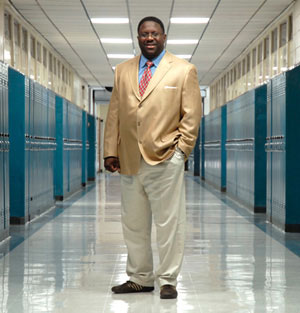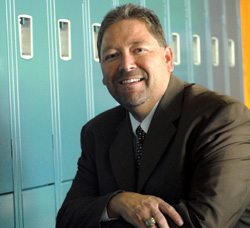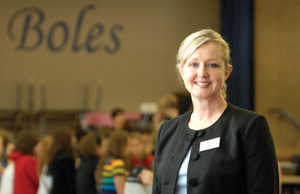FEATURE
STORIES
A matter of principals
UT Arlington-trained educators mold area schoolchildren

Grand Prairie High School Principal Joseph Showell is one of 900 to complete the College of Education's field-based administrator program.
Almost every kid remembers a few anxious moments in the principal’s office. Students summoned to those offices today—especially in Fort Worth-Dallas—often find a UT Arlington graduate behind the big desk.
Through its master of education degree in educational leadership and policy studies with Texas principal certification, the College of Education is preparing alumni to run area elementary, middle, junior high and high schools.
From Kemp to Crowley, Fort Worth to Whitewright, Irving to Everman, grads lead students, their parents, teachers and staff through the complexities of 21st century education.
Established in 1996, the education cohort system organizes students into groups of 18-20 who begin and generally complete the 39-hour course of study as a team. The intensive, field-based administrator preparation program spans five consecutive semesters over 18 months. Nearly 900 have completed the program since its inception.
Charles Funkhouser, chair of the Educational Leadership and Policy Studies Department, calls the experience a kind of group think.
“One of its greatest values is predictability,” he said. “I can tell students, ‘A year and a half from now at this time, you will have completed this program.’ ”
The cohort design also offers opportunities for networking, both within a district and throughout the Metroplex. “You build relationships; folks from different districts start to network,” Dr. Funkhouser said. “Then, when jobs open up, people let you know.”
Four cohorts meet currently, and new ones form every semester. Options include the Urban Collaborative for Educational Leadership (UCEL), which meets in downtown Dallas and serves educators from the Dallas, Irving and Richardson school districts; Educational Leadership UTA (ELUTA), which meets on campus and offers open enrollment to any interested educator; and two Scholars of Practice cohorts, one that is open enrollment and meets in downtown Fort Worth, and another for educators from the Hurst-Euless-Bedford school district that meets at the district’s administration center.
Assistant Chair Ernest Johnson, a former principal himself, cites research showing that “people in a cohort finish at higher rates—they have a support group.” Even students who take what Dr. Johnson calls the traditional route—a non-cohort program—tend to form study groups and work through the classes together.
He estimates that more than 60 UT Arlington graduates are principals in North Texas schools and that another 200 are assistant principals or hold other administrative positions. Several are superintendents.
‘We really pushed each other’
Colleyville Heritage High School Principal Becky Prentice and Grand Prairie High School Principal Joseph Showell completed the cohort program in 1999. Both began their careers as math teachers, and Prentice in particular never envisioned administration. But as a middle school teacher, she realized there was “more to teaching than just teachers.” She was a department chair for several years before returning to college for her master’s degree and principal certification.
“I could see that in administration I could have a bigger effect,” she said. “I could see things to be done and ways to have a positive impact on the larger group. I kept thinking about the instructional pieces we could implement to improve the whole school.”
After serving as an assistant principal at Colleyville Heritage and then as principal at Colleyville Middle School, Prentice returned to the high school as principal in 2006.
“As I learn more, I see more of how I can work to positively impact the entire community,” she said.
Newsweek ranked the 2,500-student Colleyville Heritage school 95th in the nation in a report based on advanced placement scores. In the same report, the school ranked fifth in Texas.

First-year Principal David Gutierrez leads Arlington's predominantly Hispanic Thornton Elementary.
“We’re implementing some exciting innovations,” Prentice said. “It is very challenging to balance the needs of so many different groups. We’re identifying at-risk students and targeting those most in need. We’ve hired additional teachers to help catch up students who are behind on credits, and we’re really going to ramp up our professional learning community.
“The biggest challenge I see as a principal is figuring out how to work in the students’ technological world. How do we keep up with the technology when we are immigrants in their world?”
Showell, who became the Grand Prairie High School principal in July, is a third-generation educator, proudly displaying his grandmother’s 1926 teaching certificate on his office wall. Like her, he meets challenges head on.
“My grandmother was a teacher in an era when most African Americans were still treated as slaves,” he said. “What I learned from her is that you make it. You do what you have to do. People need to come to work and do their job for the kids.”
Showell began his administration in meetings with parents, teachers and students in Grand Prairie. He wanted to get a feel for the school before making major decisions. He also evaluated the data, particularly that relating to the school’s underperforming Texas Assessment of Knowledge and Skills (TAKS) scores.
Such number crunching comes naturally to Showell, who was familiar with the process from his days in the UT Arlington education cohort, where professors repeatedly emphasized the use of data in educational decision-making.
“They were looking at data back when other people were just spouting opinion,” he said.
“I’ve got to give teachers the data. Your answer about a situation is only as strong as your knowledge of the situation. The district has already addressed many systems that were working against our success, and we’re going to put several initiatives into place. You’ll see a different outcome this year.”
Showell said his UT Arlington experience provided a support group where members shared ideas.
“Our cohort was strong. We really pushed each other, and the diversity allowed for some very interesting conversations. We had people from small districts, large districts, rural and urban districts, charter schools. We talked a lot about student achievement and had some great debates.”
‘These kids need you’
Whether the label is middle school or junior high, pre-teen and early teen students present a different set of challenges. Michelle Wilmoth, principal at Boles Junior High in Arlington, and Derrell Douglas, who heads Coble Middle School in Mansfield, appear up to the task.
After working in high schools as a teacher and assistant principal for 25 years, Wilmoth moved to the principal’s office last year.
“I’ve learned a whole lot about the way junior high works. It’s not really the end of elementary school; it’s actually the beginning of high school,” she said. “This is not a nebulous no-man’s land. You’ve got to treat it as if it’s the beginning of high school and provide a rigorous curriculum. We’ve got to prepare these kids for high school.”

- Boles Junior High Principal Michelle Wilmoth.
As with all UT Arlington cohort members, Wilmoth’s preparation involved on-the-job training. In addition to classwork, each cohort member works as an assistant principal or some type of administrator.
“It was very much a hands-on program,” she said. “When we met as a class, we would bring in issues that we were dealing with in our schools: how to handle legal issues, what to do with students under the influence of drugs or alcohol, things like that. We saw it at school and then worked on it in class.”
Douglas also values the program’s learn-by-doing nature.
“You can’t tell by watching what the job of principal or assistant principal is really like,” he said. “Going from teaching to assistant, then from assistant to principal was not what I thought it would be. I was surprised by some of the behaviors going on in the school. I didn’t really know about it because my kids behaved.
“My training at UT Arlington gave me an awareness and an introduction, and I felt well-prepared to be an assistant principal.”
Although he sometimes feels concerned that administrative duties distance him from the students, Douglas works to counteract that.
“I enjoy being around kids this age,” he said. “I like getting to know them, and I like their sense of humor. My jokes are too low level for high school. These kids need you, and it’s nice to be needed.”
David Gutierrez, principal at Arlington’s Thornton Elementary School, thinks he has found precisely the place where he’s most needed.
After starting out as a first-grade bilingual teacher in 1998, he has moved through Thornton’s assistant principal’s office and this year took the reins as principal. The student body is 88 percent Hispanic.
“The population is me,” he said. “I am a Mexican immigrant; my family came to the United States when I was 4 years old.”
Two years ago, the school’s TAKS scores drew a state rating of academically unacceptable. Change had to come, and it did.
“We pretty much put together individual education plans for every child,” Gutierrez said. “The reality is that the only way to help is to work with individuals. We had a lot of support from the district, and every teacher on our campus was involved. Even the fine arts and P.E. teachers stayed after school for science training. Some days we were up here until 7 p.m.”
The results were worth the effort. In 2007 Thornton raised science scores by 30 percent, achieved an academically acceptable rating and was only a few points shy of being a “recognized” school.
“It is doable,” Gutierrez said. “It’s very difficult, but it’s doable. Some people don’t see anything beyond the state scores. But if you dig a little deeper, you’ll see great things going on here and at almost any school. When kids start performing academically, their whole attitude changes. They see things that they never dreamed were possible for them.”
Almost as one, these high school, junior high, middle school and elementary school principals praise their UT Arlington training. And all agree with Colleyville Heritage’s Prentice when she said, “I’m loving what I’m doing, but I’m not finished yet. I have a lot more ideas and a lot more to do.”
With a lot more students reaping the benefits.
— Sherry W. Neaves
Other Stories
Leadership investments
Corporate gifts establish Goolsby Academy scholarship, professorship
Mavericks Personified: Tommy Le Noir
Alumnus brings crime-solving savvy to reality series
The speed of life
Professors’ book examines fast-paced families
Former stars join athletics hall
Ceremony also honors men’s track and field teams
Alumni Association awards scholarships, hosts programs
Search
Contact Us
Office of University Publications
502 S. Cooper St.279 Fine Arts Building
Box 19647
Arlington, TX 76019-0647
